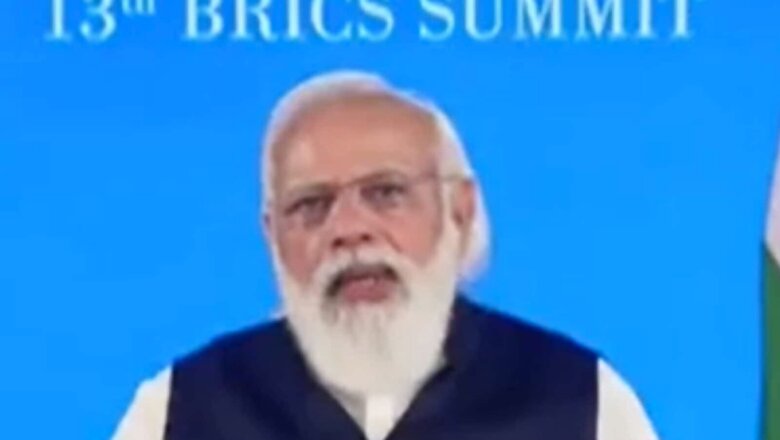
views
The focus of the 13th BRICS summit was expected to be the Afghanistan crisis and terrorism, and the five-nation grouping (Brazil, Russia, India, China, South Africa) discussed the matter at length on Thursday by adopting a counter-terrorism action plan included in the ‘New Delhi Declaration’. The declaration also highlights issues such as cooperation on the study of the origins of Covid-19, need for enhanced multilateral system of governance, climate change among others.
The virtual summit was chaired by India and Prime Minister Narendra Modi, in his opening address, said, “It is a matter of great pleasure for me and India to chair this summit on occasion of the 15th anniversary of BRICS.”
The summit was attended by Russian President Vladimir Putin, Chinese President Xi Jinping, South African President Cyril Ramaphosa and Brazil’s Jair Bolsanaro. The theme for the Summit was ‘BRICS@15: Intra-BRICS cooperation for continuity, consolidation and consensus’.
Here are 10 points to highlight key outcomes of the BRICS summit:
1. The counter-terrorism plan adopted by the BRICS is key as Afghanistan reels from the Taliban’s hostile takeover. This poses several security challenges in the region.
2. PM Modi highlighted the situation in Afghanistan and said the country should not become a “threat to its neighbouring countries, a source of drug trafficking and terrorism”.
3. BRICS leaders also underscored the priority of fighting terrorism, including the prevention of any bid by terror organisations to use Afghanistan as a sanctuary to carry out attacks against other countries. Putin said he wanted to “see Afghans live in peace” and advocated that the world stay away from their “internal affairs and respect their sovereignty”.
4. BRICS countries are also emphasised the need to address the humanitarian situation and uphold human rights, including those of women, children and minorities, in Afghanistan.
5. Leaders also called for refraining from violence and settling the situation by peaceful means in Afghanistan, through an inclusive intra-Afghan dialogue so as to ensure stability, civil peace, law and order in the country.
6. Leaders highlighted the need for cooperation on study of the origins of the novel coronavirus and hailed extensive global immunisation as a public good.
7. Leaders acknowledged that continued relevance of the UN system would be determined by its ability to adapt to contemporary realities. They resolved to make global governance more responsive and agile, effective, transparent, democratic, representative and accountable to member states.
8. Leaders commended the signing of the agreement among BRICS Space Agencies on Cooperation on BRICS Remote Sensing Satellite Constellation, which will help enhance capabilities in research on global climate change, disaster management, environmental protection, prevention of food and water scarcity and sustainable socio-economic development.
9. On climate issues, leaders expressed commitment to the full implementation of the UNFCCC, its Kyoto Protocol and Paris Agreement, and to the principles of UNFCCC including ‘Common But Differentiated Responsibilities and Respective Capabilities’ in the light of different national circumstances.
10. They welcomed the launch of the BRICS alliance for green tourism to promote measures that can shape a more resilient, sustainable and inclusive tourism sector.
Read all the Latest News, Breaking News and Assembly Elections Live Updates here.














Comments
0 comment